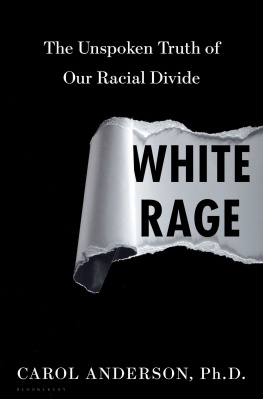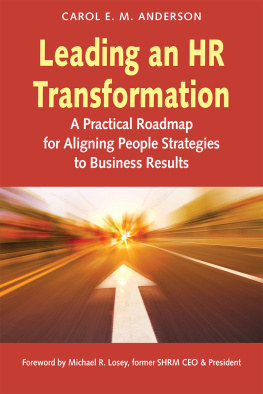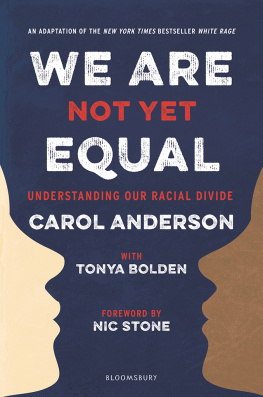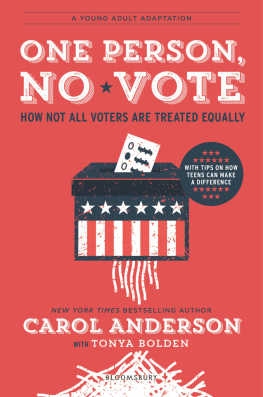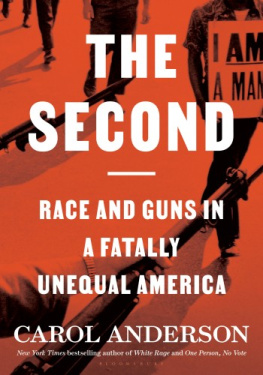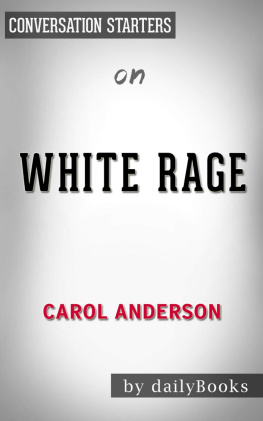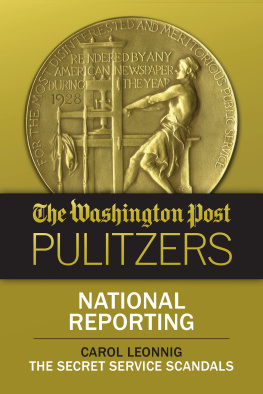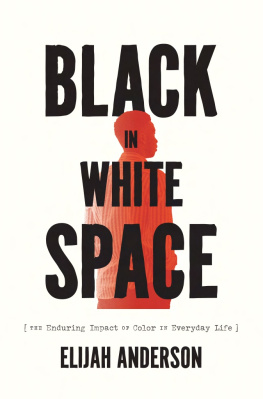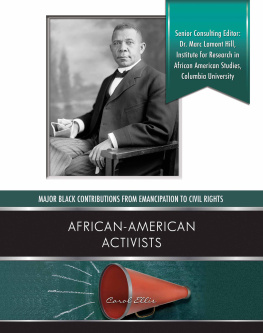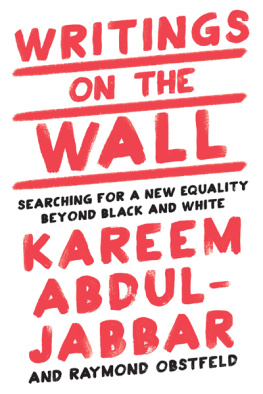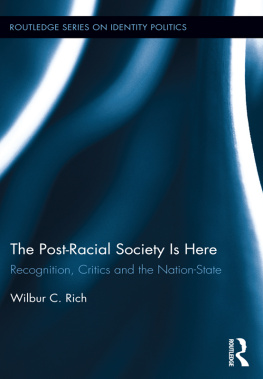To Those Who Aspired and Paid the Price

Contents
Though the killing was horrific enoughforty-one bullets were fired, nineteen of which hit their targetwhat left me truly stunned was the clinical, antiseptic policy rationale espoused by New York City mayor Rudy
But restrained and behaved police dont fire forty-one bullets at an unarmed man. Moreover, New Yorks aggressive law enforcement policy appeared to expend most of its energy on the groups bringing the smallest yield of criminal activity. In 1999, blacks and
There obviously was so much more going on here with Amadou Only I didnt know what to call it, what to name the unsettling and disturbing performance by Giuliani that I had just witnessed.
Fifteen years later, I experienced that same feeling, although the circumstances this time were somewhat different. In August 2014, Ferguson, Missouri went up in flames, and commentators throughout the print and digital media served up variations of the same story: African Americans, angered by the police killing of an unarmed black teen, were taking out their frustration in unproductive and predictable waysrampaging, burning, and looting.
Framing the discussiondominating it, in factwas an overwhelming focus on black rage. Op-eds and news commentators debated whether Michael Brown was surrendering to or assaulting a police officer when six bullets took him down. They wrangled over whether Brown was really an innocent eighteen-year-old college student or a thug who had just committed a strong-arm robbery. The operative question seemed to be whether African Americans were justified in their rage, even if that rage manifested itself in the most destructive, nonsensical ways. Again and again, across Americas ideological spectrum, from Fox News to MSNBC, the issue was framed in terms of black rage, which, it seemed to me, entirely missed the point.
I had previously lived in Missouri and had seen the subtle but powerful ways that public policy had systematically undercut democracy in the state. When, for example, the New York.
That led to an epiphany: What was really at work here was white rage. With so much attention focused on the flames, everyone had ignored the logs, the kindling. In some ways, it is easy to see why. White rage is not about visible violence, but rather it works its way through the courts, the legislatures, and a range of government bureaucracies. It wreaks havoc subtly, almost imperceptibly. Too imperceptibly, certainly, for a nation consistently drawn to the spectacularto what it can see. Its not the Klan. White rage doesnt have to wear sheets, burn crosses, or take to the streets. Working the halls of power, it can achieve its ends far more effectively, far more destructively. In my Washington Post op-ed, therefore, I set out to make white rage visible, to blow graphite onto that hidden fingerprint and trace its historic movements over the past 150 years.
The trigger for white rage, inevitably, is
And all the while, white rage manages to maintain not only the upper hand but also, apparently, the moral high ground. Its Giuliani chastising black people to fix the problems in their own neighborhoods instead of always scapegoating the police. Its the endless
The truth is that enslaved Africans plotted and workedhardwith some even fighting in the Union army for their freedom and citizenship. After the Civil War, they took what little they had and built schools, worked the land to establish their economic independence, and searched desperately to bring their families, separated by slavery, back together. That drive, initiative, and resolve, however, was met with the Black Codes, with army troops throwing them off their promised forty acres, and then with a slew of Supreme Court decisions eviscerating the Thirteenth, Fourteenth, and Fifteenth Amendments.
The truth is that when World War I provided the opportunity in the North for blacks to get jobs with unheard-of pay scales and, better yet, the chance for their children to finally have good schools, African Americans fled the oppressive conditions in the South. White authorities stopped the trains, arresting people whose only crime was leaving the state. They banned a nationally distributed newspaper, jailed people for carrying poetry, and instituted another form of slavery under the ruse of federal law. Not the First Amendment, the right to travel, nor even the basic laws of capitalism were any match.
The truth is that opposition to black advancement is not just a Southern phenomenon. In the North, it has been just as intense, just as determined, and in some ways just as destructive. When, during the Great Migration, African Americans moved into the cities, ready to work hard for decent housing and good schools, they were locked down in uninhabitable slums. To try to break out of that squalor with a college degree or in a highly respected profession only intensified the response: Perjured testimony was transmuted into truth; a future Nuremberg judge ran roughshod over state law; and even the bitterest newspaper rivals saw fit to join together when it came to upholding a lie.
The truth is that when the Brown v. Board of Education decision came down in 1954 and black children finally had a chance at a decent education, white authorities didnt see children striving for quality schools and an opportunity to fully contribute to society; they saw only a threat and acted accordingly, shutting down schools, diverting public money into private coffers, leaving millions of citizens in educational rot, willing even to undermine national security in the midst of a major crisisall to ensure that blacks did not advance.
The truth is that the hard-fought victories of the Civil Rights Movement caused a reaction that stripped Brown of its power, severed the jugular of the Voting Rights Act, closed off access to higher education, poured crack cocaine into the inner cities, and locked up more black men proportionally than even apartheid-era South Africa.
The truth is that, despite all this, a black man was elected president of the United States: the ultimate advancement, and thus the ultimate affront. Perhaps not surprisingly, voting rights were severely curtailed, the federal government was shut down, and more than once the Office of the President was shockingly, openly, and publicly disrespected by other elected officials. And as the judicial system in state after state turned free those who had decided a neighborhoods safety meant killing first and asking questions later, a very real warning was sent that black lives dont matter.
The truth is, white rage has undermined democracy, warped the Constitution, weakened the nations ability to compete economically, squandered billions of dollars on baseless incarceration, rendered an entire region sick, poor, and woefully undereducated, and left cities nothing less than decimated. All this havoc has been wreaked simply because African Americans wanted to work, get an education, live in decent communities, raise their families, and vote. Because they were unwilling to take no for an answer.
Thus, these seemingly isolated episodes reaching back to the nineteenth century and carrying forward to the twenty-first, once fitted together like pieces in a mosaic, reveal a portrait of a nation: one that is the unspoken truth of our racial divide.
In 1861, the day of reckoning came. The Southern states determination to establish their independent slave republic led to four years of war, 1.5 million casualties, including at least 620,000 deaths, and 20 percent of Southern white males wiped off the face of the earth.
In his second inaugural address, in 1865, Abraham Bureau, with its mandate to provide land and education. Redemption for the countrys sin, therefore, would require not just the end of slavery but also the recognition of full citizenship for African Americans, the right to vote, an economic basis to ensure freedom, and high-quality schools to break the generational chains of enforced ignorance and subjugation.
Next page
